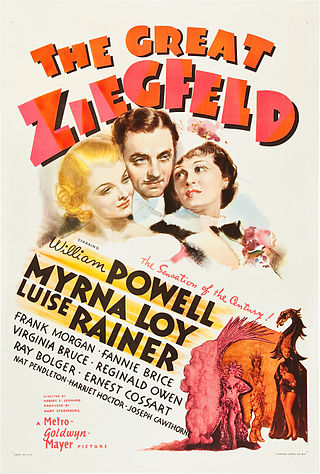
The Great Ziegfeld is a 1936 American musical drama film directed by Robert Z. Leonard and produced by Hunt Stromberg. It stars William Powell as the theatrical impresario Florenz "Flo" Ziegfeld Jr., Luise Rainer as Anna Held, and Myrna Loy as Billie Burke.

James Francis Durante was an American comedian, actor, singer, and pianist. His distinctive gravelly speech, Lower East Side accent, comic language-butchery, jazz-influenced songs, and prominent nose helped make him one of the United States' most familiar and popular personalities of the 1920s through the 1970s. He often referred to his nose as the schnozzola, and the word became his nickname.
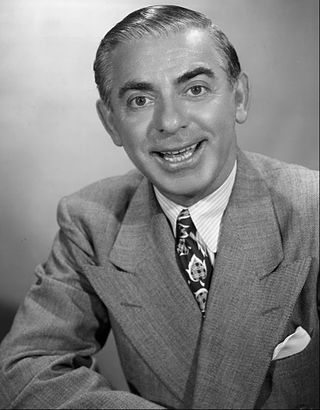
Eddie Cantor was an American comedian, actor, dancer, singer, songwriter, film producer, screenwriter and author. Cantor was one of the prominent entertainers of his era.
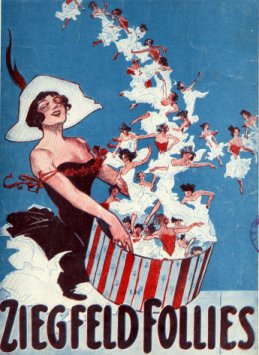
The Ziegfeld Follies were a series of elaborate theatrical revue productions on Broadway in New York City from 1907 to 1931, with renewals in 1934, 1936, 1943, and 1957. They became a radio program in 1932 and 1936 as The Ziegfeld Follies of the Air.
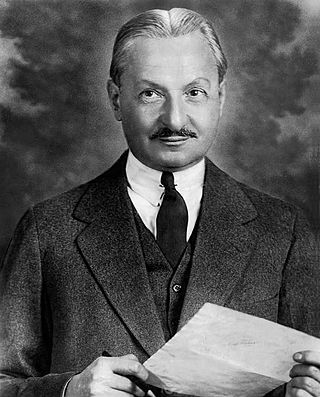
Florenz Edward Ziegfeld Jr. was an American Broadway impresario, notable for his series of theatrical revues, the Ziegfeld Follies (1907–1931), inspired by the Folies Bergère of Paris. He also produced the musical Show Boat. He was known as the "glorifier of the American girl". Ziegfeld is a member of the American Theater Hall of Fame.

The Hollywood Palace is an hourlong American television variety show broadcast Saturday nights on ABC from January 4, 1964, to February 7, 1970. Titled The Saturday Night Hollywood Palace for its first few weeks, it began as a midseason replacement for The Jerry Lewis Show, another variety show, which lasted only three months.

Marilyn Miller was one of the most popular Broadway musical stars of the 1920s and early 1930s. She was an accomplished tap dancer, singer and actress, and the combination of these talents endeared her to audiences. On stage, she usually played rags-to-riches Cinderella characters who lived happily ever after. Her enormous popularity and famed image were in distinct contrast to her personal life, which was marred by disappointment, tragedy, frequent illness, and ultimately her sudden death due to complications of nasal surgery at age 37.
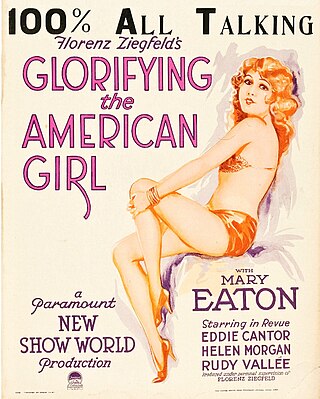
Glorifying the American Girl is a 1929 American pre-Code musical comedy film produced by Florenz Ziegfeld that highlights Ziegfeld Follies performers. The last third of the film, which was filmed in early Technicolor, is basically a Follies production, with appearances by Rudy Vallee, Helen Morgan, and Eddie Cantor.

Mickey's Gala Premier is a Walt Disney cartoon produced in 1933, directed by Burt Gillett, and featuring parodies of several famous Hollywood film actors from the 1930s. It was the 58th Mickey Mouse short film, and the eighth of that year.
Show Girl is a musical by William Anthony McGuire that ran from Jul 2, 1929 to Oct 5, 1929. A backstage musical, much of the action of the musical's story takes place at the Ziegfeld Theatre in New York City. Other scenes take place in Trenton, New Jersey; Brooklyn; and at a Penthouse apartment in New York City. The show tells the story of aspiring Broadway showgirl Dixie Dugan as she is pursued by four suitors. The music was written by George Gershwin, with lyrics by Ira Gershwin and Gus Kahn.

The Story of Will Rogers is a 1952 American Comedy Western film biography of humorist and movie star Will Rogers, directed by Michael Curtiz and starring Will Rogers Jr. as his father. The supporting cast features and Jane Wyman. The film's screenplay was based on the true short story "Uncle Clem's Boy" by Rogers' widow Betty Blake, which was published in The Saturday Evening Post in 1940.

Aline Laveen MacMahon was an American actress. Her Broadway stage career began under producer Edgar Selwyn in The Mirage during 1920. She made her screen debut in 1931, and worked extensively in film, theater, and television until her retirement in 1975. She was nominated for an Academy Award for Best Supporting Actress for her performance in Dragon Seed (1944).

Trocadero is a 1944 American musical comedy film directed by William Nigh and starring Rosemary Lane, and Johnny Downs, Ralph Morgan, Dick Purcell, Sheldon Leonard, Cliff Nazarro, Marjorie Manners, and Erskine Johnson.
Marilyn Erskine is an American actress who started performing at the age of three on radio, and has since appeared in radio, theater, film and television roles from the 1920s through the 1970s.

Henry Keefe Brasselle was an American film actor, television actor/producer and author. He is best remembered for the starring role in The Eddie Cantor Story (1953).
Lou Clayton was an American song-and-dance vaudeville performer, best known for his teaming with Jimmy Durante and Eddie Jackson, as Clayton, Jackson, and Durante, or "The Three Sawdust Bums".

Bannerline is a 1951 American drama film directed by Don Weis. The film stars Keefe Brasselle, Sally Forrest and Lionel Barrymore.

Edward Jackson was a leading vaudeville performer, actor and musician, and longtime colleague and partner of Jimmy Durante. He appeared in vaudeville with Durante and Lou Clayton as the team Clayton, Jackson & Durante, known as the "Three Sawdust Bums."
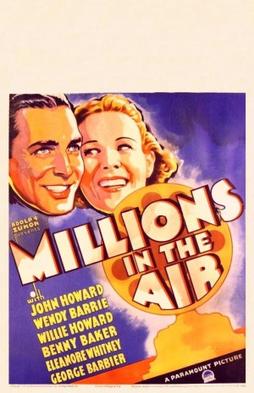
Millions in the Air is a 1935 American comedy film directed by Ray McCarey and written by Sig Herzig and Jane Storm. The film stars John Howard, Wendy Barrie, Willie Howard, George Barbier, Benny Baker, Eleanore Whitney and Robert Cummings. The film was released on December 12, 1935, by Paramount Pictures.
Ziegfeld: The Man and His Women is a 1978 television biopic based on the life of theater impresario Florenz Ziegfeld. It was directed by Buzz Kulik and stars Paul Shenar as Ziegfeld, Samantha Eggar as Billie Burke, Barbara Parkins as Anna Held, Walter Willison as Frank Carter, Catherine Jacoby as Fanny Brice, and Inga Swenson as Nora Bayes. It was produced by Columbia Pictures and first aired on NBC in May 1978. Patricia Ziegfeld Stephenson, daughter of Ziegfeld and Billie Burke, was a consultant on the film. The film was nominated for several Emmy Awards for 1978 winning in the cinematography category, Gerald Finnerman.
















